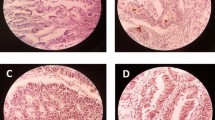Abstract
Background and Purposes
Most colorectal tumors develop from adenomatous polyps, which are detected by colonoscopy. African Americans (AAs) have higher incidence of colorectal cancer (CRC) and greater mortality from this disease than Caucasian Americans (CAs). We investigated whether differences in predisposition to CRC and its surrogate (colonic adenomas) between these ethnic groups were related to numbers of cancer stem or stem-like cells (CSCs) in colonocytes.
Methods
We analyzed colonic effluent from 11 AA and 14 CA patients who underwent scheduled colonoscopy examinations at the John D. Dingell Veterans Affairs Medical Center. We determined proportions of cells that expressed the CSC markers CD44 and CD166 by flow cytometry.
Results
The proportion of colonocytes that were CD44+CD166− in effluent from patients with adenomas was significantly greater than from patients without adenomas (P = 0.01); the proportion of CD44+CD166+ colonocytes was also greater (P = 0.07). Effluent from AAs with adenomas had 60 % more CD44+166− colonocytes than from CAs with adenomas. Using cutoff values of 8 % for AAs and 3 % for CAs, the proportion of CD44+166− colonocytes that had positive predictive value for detection of adenomas was 100 % for AAs and CAs, determined by receiver operator characteristic curve analysis.
Conclusion
The proportion of CD44+166− colonocytes in colonic effluent can be used to identify patients with adenoma. AAs with adenomas have a higher proportion of CD44+166− colonocytes than CA. The increased proportion of CSCs in colonic tissue from AA might be associated with the increased incidence of CRC in this population.


Similar content being viewed by others
References
Jemal A, Siegel R, Xu J, Ward E. Cancer statistics, 2010. CA Cancer J Clin. 2010;60:277–300.
Jordan CT, Guzman ML, Noble M. Cancer stem cells. N Engl J Med. 2006;355:1253–1261.
Ricci-Vitiani L, Fabrizi E, Palio E, De Maria R. Colon cancer stem cells. J Mol Med. 2009;87:1097–1104.
Dalerba P, Dylla SJ, Park IK, et al. Phenotypic characterization of human colorectal cancer stem cells. Proc Natl Acad Sci USA. 2007;104:10158–10163.
O’Brien CA, Pollett A, Gallinger S, Dick JE. A human colon cancer cell capable of initiating tumour growth in immunodeficient mice. Nature. 2007;445:106–110.
Sanders MA, Majumdar APN. Colon cancer stem cells: implications in carcinogenesis. Front Biosci. 2011;16:1651–1662.
Chu P, Clanton DJ, Snipas TS, et al. Characterization of a subpopulation of colon cancer cells with stem cell-like properties. Int J Cancer. 2009;124(6):1312–1321.
Feng HL, Liu YQ, Yang LJ, et al. Expression of CD133 correlates with differentiation of human colon cancer cells. Cancer Biol Ther. 2010;9(3):216–223.
Patel BB, Yu Y, Du J, Levi E, Phillip PA, Majumdar AP. Age-related increase in colorectal cancer stem cells in macroscopically normal mucosa of patients with adenomas: a risk factor for colon cancer. Biochem Biophys Res Commun. 2009;378:344–347.
Agrawal S, Bhupinderjit A, Bhutani MS, et al. Colorectal cancer in African Americans. Am J Gastroenterol. 2005;100:515–523; discussion 514.
Dimou A, Syrigos KN, Saif MW. Disparities in colorectal cancer in African-Americans vs Whites: before and after diagnosis. World J Gastroenterol. 2009;15:3734–3743.
Somatic Cell Sampling & Recovery Fecal Cell Isolation Kit: Protocols and Recommendations. In: Technologies N, ed. Elkridge, 2009. http://noninvasivetech.com/
Albaugh GP, Iyenger V, Lohani A, Malayeri M, Bala S, Nair PP. Isolation of exfoliated colonic epithelial cells, a novel, non-invasive approach to the study of cellular markers. Int J Cancer. 1992;52:347–350.
Iyenger V, Albaugh GP, Lohani A, Nair PP. Human stools as source of viable colonic epithelial cells. FASEB. 1991;5:2856–2859.
Thornton JG, Morris AM, Thornton JD, Flowers CR, McCashland TM. Racial variation in colorectal polyp and tumor location. J Natl Med Assoc. 2007;99:723–728.
Nouraie M, Hosseinkhah F, Brim H, Zamanifekri B, Smoot DT, Ashktorab H. Clinicopathological features of colon polyps from African-Americans. Dig Dis Sci. 2010;55:1442–1449.
Kanwar SS, Yu Y, Nautiyal J, Patel BB, Majumdar AP. The Wnt/beta-catenin pathway regulates growth and maintenance of colonospheres. Mol Cancer. 2010;9:212.
Weichert W, Knosel T, Bellach J, Dietel M, Kristiansen G. ALCAM/CD166 is overexpressed in colorectal carcinoma and correlates with shortened patient survival. J Clin Pathol. 2004;57:1160–1164.
Acknowledgments
We wish to thank Pastor George D. Wilkinson and Word of Life Christian Church in Flint Michigan for so graciously donating money for the reagents in this study. We also want to thank Dr Padmanabhan Nair of NonInvasive Technologies for the colonocyte isolation supplies. We also wish to acknowledge the Nursing Staff and Physicians of the Gastroenterology Unit at the JDD-VAMC for their support in helping with the patients who participated in the study. Most of all we wish to thank the patients of the JDD-VAMC for their heart-felt participation. This material is the result of work supported with resources and the use of facilities at the JDD-VAMC. The work was supported by the NIH/NIA Diversity Supplement 5R01AG014343-13 and the Department of Veterans Affairs to Dr Majumdar.
Author information
Authors and Affiliations
Corresponding author
Additional information
The contents of this manuscript do not represent the views of the Department of Veterans Affairs or the United States Government.
Rights and permissions
About this article
Cite this article
Leavell, B.J., Van Buren, E., Antaki, F. et al. Associations Between Markers of Colorectal Cancer Stem Cells and Adenomas Among Ethnic Groups. Dig Dis Sci 57, 2334–2339 (2012). https://doi.org/10.1007/s10620-012-2195-3
Received:
Accepted:
Published:
Issue Date:
DOI: https://doi.org/10.1007/s10620-012-2195-3




